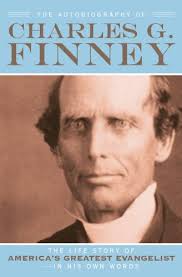The evangelist must produce excitements sufficient to induce people to repentance.
Thus wrote the controversial Charles G. Finney, one of the most influential men in American church history. He is credited with developing a new method for evangelism and with over half a million ‘decisions for Christ’. On the other hand, some point out that the region he worked in has become a ‘spiritual wasteland’ and suggest that is because of the emotionalism and theology of his approach.
One way for our teens to learn more about Finney is to read his autobiography…or is it? Written over 40 years after many of the events described, The Autobiography of Charles G. Finney evidences an extraordinarily detailed memory for events, people, conversation and emotion. Obviously, an author writing about himself will spend a lot time talking about himself, but Finney’s almost constant self-approval and his frequent mention of his mistaken opponents make me even more hesitant to accept his word. As a scientist, I know about selection bias, about revisionist memories of data not written down at the time, and about the difficulty of getting accurate data even of physical phenomena, let alone complex social/spiritual ones like revivals.
Although Finney’s autobiography raises significant theological and psychological questions, it is worth reading if only because of his tremendous legacy. Under Finney’s continuing influence, the focus of many churches in the United States shifted from worshipping God, albeit imperfectly, to setting up conditions that would drive people to ‘make a decision for Christ’. According to Finney, this moment of decision is crucial, and he refined methods to encourage large numbers of people to get to that stage.
It’s all about the will, Finney believed, and about encouraging people to want to stop being sinners and to decide to become Christians. Finney saw his role as overcoming stubbornness and passivity which was all that was standing between people and conversion. He said that people’s sin nature is not a real issue; since all are voluntary sinners, they can simply decide to stop sinning and be converted. Finney prayed, preached, taught, and encouraged, converting thousands to religion and converting many ministers to his goals and methods.
While Finney undoubtedly meant well and was extraordinary leader, his legacy of focusing on an emotionally-induced decision has produced a Christianity that has been described as continent-wide and inch-deep. Finney focused on people, but Christianity is not about us. It’s about Christ. Therefore the focus of our church services should not be ourselves, but our God. Furthermore, conversion numbers are meaningless if the converts are not discipled and taught to love the Lord. And, countering Finney’s biggest departure from the Bible: we are not voluntary sinners who can just make a decision to be saved; salvation is a gift of God, not something we do for ourselves.
When the classical high school program Omnibus listed The Autobiography of Charles G. Finney, I was surprised at first. However, recognizing how pervasive Finney’s ideas are in North America’s churches, I now understand. It is important to understand the roots of our society’s commonly accepted ideas. How else can we evaluate them consciously and compare them with God’s Word?
Surely, this is one of the aims of a Christian classical education: to teach our children to ‘understand the times’ in the light of the Bible and so to equip them to be lights in the world.
This is yet another book in the 2013 52 Books in 52 Weeks Challenge and is also linked to Saturday Reviews and Trivium Tuesdays.
Disclosure: We bought Finney’s autobiography for our study of the Omnibus curriculum. As usual, I am not compensated for this review.


Thank you for this review. It was very informative. I had not thought about Finney for many years.
You’re welcome, George. Sometimes it’s good to remember things and rethink them in our current context.